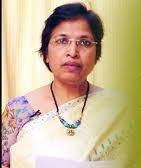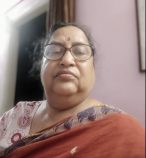
Haunting Voices: Heard and Unheard
‘Savitri’ by Vimala
-Syamala Kallury
Grandma: Ravi where have you been? Do you want your story tonight?
Ravi: Sure, Grandma! I’d never turn down an opportunity to hear your stories. They always give me something to ponder over before I go to sleep…like food for thought. They are trying to tell me something about our land, our language and our cultural practices. So…, whose story have you chosen today?
Grandma: It is a story called Savitri written by Vimala.
Ravi; Who is she?
Grandma: I am coming to that. She is mainly a poet, but occasionally writes stories too. She was born in May 1960. A lawyer by profession, she has been actively working in the social sector and currently associated as a consultant with an organisation called Rainbow Homes in Hyderabad.
She is a poet of repute and Adavi Uppongina Ratri is the title of her poetry collection. In addition to poetry, she also has written many short stories based on feminist ideology. A staunch advocate of women’s rights, she actively participates in the activities of the progressive writers in Andhra. She is an active member of several progressive literary movements in the Telugu literature.
Now, on to Savitri, which was published in a 2015 edition of the Katha Sahiti Volume. To get published in this volume is in itself a recognition. For the past three decades, Katha Sahiti has been bringing out an annual volume of select stories chosen from progressive writers that are in keeping with high standards of storytelling.
Savitri is the protagonist who was a single mother to her two children, daughter Arunima and son Kranthi. As the story opens, Arunima is heard asking her mother that if her father wants to meet her, would she be okay with that. Savitri gives a non-committal response and says that replies that the house is now Arunima’s so the choice is also hers. Her answer displays a strong resentment to meet her husband, but she cannot refuse as she senses that both her children want to bring their father into their lives and home. After a brief argument and discussion Savitri agrees to see her husband. She has long since stopped thinking of him as her husband as he deserted her thirty years ago, leaving her with two children. He never looked back even once. ‘If it is only to meet once let him come,’ Savitri finally relents.
After one week two men brought Prakasa Rao to their house and left him here. A man she saw almost thirty years back sat in front of her old and weak. Both of them did not have anything to say to each other. He started reading the newspaper. Savitri wondered if this was the man for whom she ran away from home. The person now sitting in front of her was like a book read too many times with torn and wrinkled pages. He tries to talk but a cough overpowers his effort. She instinctively gets up and gets him water. She understands that both her children are in touch with him. Having been an active politician all his life, he is now showing signs of disappointment with the internal fractions and politics of his party. He was even caught when he visited the hospital once and served one year jail term for banned revolutionary activities. His age and health in addition to the new members who are more after power in the party no longer permit him to continue to remain politically active. Since Savitri’s response was not encouraging, he leaves after begging her forgiveness for callously leaving her alone in the past.
But would that actually compensate for all the troubles she faced bringing up and educating the children all by herself?
Her problem here is not hers alone. One particular sociological problem that cropped up after the 70s in Telugu states, as well as in other parts of the country, was the number of abandoned women left behind by men who left families and lives and prospective careers for the sake of political ideologies and joined the leftist movements. Several youth were disgruntled and disillusioned with the freedom that India promised. After independence the generation who expected that as a new nation India would fulfil all their dreams and get them jobs and social and economic equality were left in the lurch as a gradual deterioration had set in, in India’s political establishments. Gandhi’s idea of Purna Swaraj turned into a myth as it did not give them freedom from corruption, economic deprivation and unemployment. The Gandhian ideology had given rise to blind power mongering with increasing criminalisation in political establishments. There was unrest in all the campuses in India. Many opposition leaders were jailed during the Emergency, declared by Indira Gandhi. Many students openly joined the left revolutionary movements opposing the policies of the government. In Andhra, several communist party leaders led movements from underground. Savitri’s husband was one such political rebel. He went underground when the situation became too hot for survival. Like many wives who were left behind by men in revolutionary politics, these women faced harassment from the police, with no proper means of supporting themselves they struggled. Savitri was helped by Rashid, her husband’s friend who came to her rescue in many ways and pulled her out of the crisis, getting her a job. She found safety when he was around and asked him to stay back with her. But Rashid was put off by the society’s wagging tongues whenever he came to live with her. So, he limited his stays to a couple of days when she really needed him. Her children too started resenting Rashid in her life and that prompted him to move away from her.
The same patriarchal norms that guide society in normal traditional households have made lives tough for Savitri and her children. When priorities are to be decided in his life, Prakasa Rao thought it was more important to follow his heart and his political ideology than to arrange matters for his wife and children during his absence. Savitri had no choice than to face life as dictated by her indifferent and insensitive husband. Again, her son Kranthi gives her an ultimatum and tells her she will have either him or Rashid in her life. She did not choose her husband and yet, he chose his political life and not his family. She could not choose Rashid as her son was against any man other than his father entering his mother’s life. Prakasa Rao leaves the house. When she was sitting alone her daughter enters and switches on the light. Savitri then tells Arunima to find out where Rashid had gone as she wants to see him once.
The stories that came into focus after the 80s glorify revolutionary politics yet the writers have been totally blind to the women who suffered because of these movements as wives, as mothers and as members of displaced families. At one time every household had one male member missing, – like Kashmir today – underground, encountered or dead, the families were unstable units with insecure and unsure children. They recognised the sacrifices of their mothers but resented the absentee fathers except in rare cases. When fathers like this returned, they were welcomed with open arms causing heartburn to mothers like Savitri, whose right to choose was forever compromised.
Vimala brings this dilemma to the forefront and if one reads the autobiographies of Kondapalli Koteswaramma or Namburi Paripurna, whose husbands were celebrated members of these underground movements, record in their memoirs how as women they were given tasks that displayed ‘use and throw’ attitude of the men of these movements. They were used to clean, cook, and wash for the male members. They were at times used to smuggle weapons from place to place, feed the men when they come secretly during the middle of the night, and hide them at the risk of their own lives. On the whole one reads these stories and are left with a bitter taste for the kind treatment that women get in these “progressive movements” which call for all kinds of equalities except gender justice and equality.
*****

Syamala Kallury taught for over a decade and a half in the AP Govt colleges in Srikakulam and Visakhapatnam as Lecturer in English She moved to Delhi after marriage where she taught in Delhi University, and in the Department of Humanities and Social Sciences at IIT Delhi till 2011 She has two daughters Ahana and Kruttika, who live in UK and Dubai respectively. Currently she lives in Visakhapatman with her dog Subbu, a cocker spaniel. A bilingual writer and translator, Syamala authored many books. 1. Telugu Short Stories women’s Voices: An Inner Voyage(1930-2000) Asian Publication House (2001)2. Twentieth Century Telugu Poetry (2006) 3. Godavari Tales Viveka Foundation (2006) 4.స్వగతాలు (2009) 5. If you Want To be a Poet, Patridge India (2018) 6. కంచికి వెళ్లకూడని కథలు navachetana పబ్లిషర్స్ (2019) 7.భావవిహంగాలు Telugu translation of Tagore’ s Stray Birds (1988, 2019)8. Rajanigandha, translation of Papineni Sivasankar’s award winning poetry collection with the same title published by Sahitya Academy New Delare ఆ few of her పబ్లికేషన్స్ in addition to a number of academic articles
